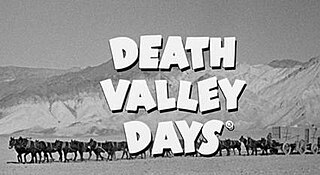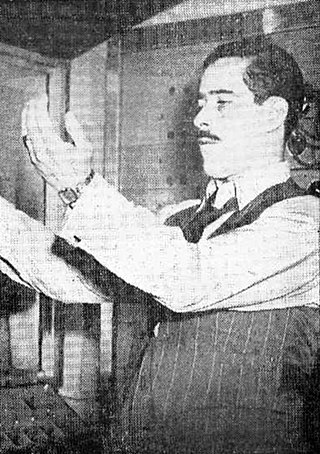Related Research Articles

Amos 'n' Andy was an American radio sitcom about black characters, initially set in Chicago then later in the Harlem section of New York City. While the show had a brief life on 1950s television with black actors, the 1928 to 1960 radio show was created, written and voiced by two white actors, Freeman Gosden and Charles Correll, who played Amos Jones (Gosden) and Andrew Hogg Brown (Correll), as well as incidental characters. On television from 1951–1953, black actors took over the majority of the roles; white characters were infrequent.

The Mutual Broadcasting System was an American commercial radio network in operation from 1934 to 1999. In the golden age of U.S. radio drama, Mutual was best known as the original network home of The Lone Ranger and The Adventures of Superman and as the long-time radio residence of The Shadow. For many years, it was a national broadcaster for Major League Baseball, the National Football League, and Notre Dame Fighting Irish football. From the 1930s until the network's dissolution in 1999, Mutual ran a respected news service along with a variety of lauded news and commentary programs. In the 1970s, Mutual pioneered the nationwide late night call-in talk radio program, introducing the country to Larry King and later, Jim Bohannon.

Gertrude Berg was an American actress, screenwriter, and producer. A pioneer of classic radio, she was one of the first women to create, write, produce, and star in a long-running hit when she premiered her serial comedy-drama The Rise of the Goldbergs (1929), later known as The Goldbergs. Her career achievements included winning a Tony Award and an Emmy Award, both for Best Lead Actress.

Irna Phillips was an American scriptwriter, screenwriter, casting agent and actress. She is best remembered for pioneering a format of the daytime soap opera in the United States geared specifically toward women. Phillips created, produced, and wrote several radio and television daytime serials throughout her career, including Guiding Light, As the World Turns, and Another World. She was also a mentor to several other pioneers of the American daytime soap opera, including Agnes Nixon, William J. Bell and Ted Corday.

Death Valley Days is an American Western anthology series featuring true accounts of the American Old West, particularly the Death Valley country of southeastern California. Created in 1930 by Ruth Woodman, the program was broadcast on radio until 1945. From 1952 to 1970, it became a syndicated television series, with reruns continuing through August 1, 1975. The radio and television versions combined to make the show "one of the longest-running Western programs in broadcast history."
Erik Barnouw was an American historian of radio and television broadcasting. At the time of his death, Barnouw was widely considered to be America's most distinguished historian of broadcasting.

One Man's Family is an American radio soap opera, heard for almost three decades, from 1932 to 1959. Created by Carlton E. Morse, it was the longest-running uninterrupted dramatic serial in the history of American radio. Television versions of the series aired in prime time from 1949 to 1952 and in daytime from 1954 to 1955.
Goodwill Court was a popular human interest radio court show of the mid-1930s that broadcast for over a year, sponsored by Chase & Sanborn Coffee. In 1936, it was ranked among the top ten radio programs, but it was cancelled in response to complaints from the American Bar Association and a decision by the New York City Supreme Court.

America's Town Meeting of the Air was a public affairs discussion broadcast on radio and television from May 30, 1935, to July 1, 1956, mainly on the NBC Blue Network and its successor, ABC Radio. One of radio's first talk shows, it began as a six-week experiment, and NBC itself did not expect much from it.

Backstage Wife is an American soap opera radio program that details the travails of Mary Noble, a girl from a small town in Iowa who came to New York seeking her future.

William N. Robson was an American director and producer of radio programs.
Macfadden Communications Group is a publisher of business magazines. It has a historical link with a company started in 1898 by Bernarr Macfadden that was one of the largest magazine publishers of the twentieth century.
A court show is a broadcast programming genre comprising legal dramas and reality legal programming. Court shows present content mainly in the form of legal hearings between plaintiffs and defendants, presided over in one of two formats: scripted/improvised with an actor portraying a judge; or, an arbitration-based reality format with the case handled by an adjudicator who was formerly a judge or attorney.
CBS Broadcasting, Inc. is an American English-language commercial broadcast television and radio network owned by Paramount Global through the CBS Entertainment Group. Along with ABC and NBC, CBS is one of the traditional "Big Three" American television networks.

Hello Americans (1942–43) is a CBS Radio series produced, directed and hosted by Orson Welles. Created to promote inter-American understanding and friendship during World War II, the series aired Sundays at 8 p.m. ET beginning November 15, 1942. Its last broadcast was January 31, 1943. Sponsored by the Office of the Coordinator of Inter-American Affairs, the drama series featured many of the actors from Welles's Mercury Theatre repertory ensemble.

Mail Call was an American radio program that entertained American soldiers from 1942 until 1945, during World War II. Lt. Col. Thomas A.H. Lewis wrote in 1944, "The initial production of the Armed Forces Radio Service was 'Mail Call,' a morale-building half hour which brought famed performers to the microphone to sing and gag in the best American manner." The program featured popular entertainers of that day, such as Bob Hope, Bing Crosby, Judy Garland, and Dinah Shore, performing musical numbers and comedy skits to boost the morale of soldiers stationed far from their homes. Lewis added, "To a fellow who has spent months guarding an outpost in the South Seas, Iceland or Africa a cheery greeting from a favorite comedian, a song hit direct from Broadway, or the beating rhythm of a hot band, mean a tie with the home to which he hopes soon to return.
Famous Jury Trials is a radio court show/dramatic anthology series in the United States. It began on January 5, 1936, and ended June 25, 1949. It is considered one of the first programs that initiated the court show genre, which later was broadcast on television as Famous Jury Trials.

Paul Edward Prentiss was an actor in the era of old-time radio. He was perhaps best known for portraying the title role on the radio version of Captain Midnight.
The Court of Missing Heirs is an American old-time radio human interest drama. It was broadcast on CBS October 11, 1937 – September 29, 1942, and on ABC March 31, 1946 – April 6, 1947. It also went by the titles The Board of Missing Heirs and Are You a Missing Heir?.

The Story of Mary Marlin is an American soap opera radio program. It was broadcast from October 3, 1934, until April 12, 1945, and returned from September 24, 1951, until April 11, 1952. After 1937 it was among the highest-rated soap operas. A version was also broadcast in Australia in 1959-1960.
References
- 1 2 3 4 Dunning, John (1998). On the Air: The Encyclopedia of Old-Time Radio (Revised ed.). New York, NY: Oxford University Press. pp. 182–183. ISBN 978-0-19-507678-3 . Retrieved 2019-10-30.
- ↑ "(photo caption)" (PDF). Radio Index. February 1935. p. 26. Retrieved 10 April 2017.
- ↑ Bianculli, David (2016). The Platinum Age of Television: From I Love Lucy to The Walking Dead, How TV Became Terrific. Knopf Doubleday Publishing Group. p. 209. ISBN 9780385540285 . Retrieved 10 April 2017.
- ↑ "True Story Returns" (PDF). Broadcasting. May 1, 1934. p. 14. Retrieved 11 April 2017.
- ↑ Erickson, Hal (2009). Encyclopedia of Television Law Shows: Factual and Fictional Series About Judges, Lawyers and the Courtroom, 1948-2008. McFarland. p. 5. ISBN 9780786454525 . Retrieved 10 April 2017.
- ↑ Hilmes, Michele (2013). Only Connect: A Cultural History of Broadcasting in the United States. Cengage Learning. p. 101. ISBN 978-1133307303 . Retrieved 10 April 2017.
- ↑ Barnouw, Erik (2001). Media Lost and Found . Fordham Univ Press. p. 151. ISBN 9780823220991 . Retrieved 10 April 2017.
Court of Human Relations radio.
- 1 2 Swain, Howard (July 1934). "Ten Million Jurors For True Story Court". Radio Mirror. 2 (3): 36–37, 76. Retrieved 12 April 2017.
- ↑ "Court of Human Relations (ad)". Radio Mirror. 6 (5): 89. September 1936. Retrieved 13 April 2017.
- 1 2 "Exploitettes". The Film Daily. September 4, 1936. p. 10. Retrieved 13 April 2017.
- ↑ "First 'Court' Short Dated". The Film Daily. August 11, 1936. p. 2. Retrieved 13 April 2017.
- ↑ McNeil, Alex (1996). Total Television (4th ed.). New York, New York: Penguin Books USA, Inc. p. 183. ISBN 0-14-02-4916-8.
- ↑ "(untitled brief)" (PDF). Broadcasting. April 13, 1959. p. 82. Retrieved 11 April 2017.
- ↑ "A.L. Alexader [sic] Acts As Mediator As New 'Court' Show Has Debut". The Daily Herald. Utah, Provo. June 22, 1959. p. 19. Retrieved April 11, 2017– via Newspapers.com.

- ↑ Ewald, William (June 24, 1959). "Television In Review". New Castle News. Pennsylvania, New Castle. United Press International. p. 28. Retrieved April 11, 2017– via Newspapers.com.

- ↑ "New programming firm enters the field" (PDF). Broadcasting. June 6, 1960. pp. 84–85. Retrieved 11 April 2017.